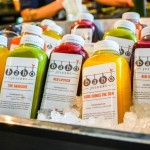The Juice On Juice Cleansing

Thanks to celebrities like Blake Lively, Nicole Richie, and Gwyneth Paltrow, the juice cleanse has become an increasingly popular fad diet and a $5 billion industry. Yeah, sure, I'd like a hot bod like Blake Lively, but is surviving off of liquid alone really worth it? To answer my question, I did a little reading up on the pros and cons of this latest diet trend.
Let's start with the basics: what is juice cleanse? Essentially, a juice cleanse is a fasting diet by limiting food intake to solely juice from fruits and vegetables for several days or even a couple of weeks. Juices can be bought ready-made from the store or homemade with a juicer and one's choice of vegetables and fruits.
The main goals of a juice cleanse are to lose weight (isn't that the point of all diets?) and to reap the benefits of the essential nutrients in fruits and vegetables. According to and article by the New York Times, average consumption of calories on the diet is about 1200 calories, or the baseline caloric recommendation per day.
Pro: You will lose weight.
Juicing reduces the number of calories you eat in a day, so if you burn more calories than you consume, you will lose weight. Simple math.
Con: Your metabolism slows down.
Cutting all the fat from your diet and restricting calories can lead to a dip in your metabolic rate. Your body needs protein, fat and other nutrients that are rarely provided in a juice fast. In "starvation mode," the body tries to store as many calories as it can, rapidly slowing down your metabolism.
Con: It is unlikely that your weight loss will be permanent.
Severe deprivation is often followed by dramatic weight gain after a fast ends. Sounds unfair, right? Your body thinks so, too. Your body feels like it is starving and encourages you to eat more in order to compensate for the calorie restriction during the juice cleanse. Once you eat actual food (yes, solid food that you have to chew), your body produces hormones that cause intense urges to eat and continue eating. This is the reason why most short-term diets fail: dieters compensate and sometimes even overcompensate to make up for the period of calorie restriction. Definition of a yo-yo diet.
Pro: Juicing is an easy way to add fruits and vegetables to your diet.
If you despise eating fruits and vegetables or find it difficult to incorporate them into your diet, juicing will supply all the essential nutrients in one delicious (maybe), hydrating glass.
Con: Juicing is not the same as eating whole fruits and vegetables.
Sure, juicing provides you with the same nutrients, but you're missing out on the fiber and antioxidants from the skin and seeds of fruits and vegetables. In addition, eating whole fruits and vegetables prevents your blood sugar levels from spiking because the fiber prevents the body from absorbing the fructose sugar as easily.
Con: Juicing is expensive.
If you're still intrigued about juicing, think about the price. For example, a day on the Suja juice cleanse programs costs $55. If you're not looking to do it through an established program, making your own juices at home is still expensive. Juicers alone cost anywhere from $30 to $300, and it takes about 10 whole fruits and vegetables to make one cup of juice. And since the diet requires about 5-7 cups of juice a day...well, that's a lot of fruit and vegetables to buy.
Let's face it: I'm a broke college student and can't afford to do a lengthy juice cleanse. Yes, the concept seems great and if Gwenyth Paltrow swears by it, it must be true, right? Well, I am not Blake Lively or Gwenyth Paltrow (yet), and for now I'll just have to stick solid food and an occasional juice like this yummy Go Green smoothie.
The post The Juice on Juice Cleansing originally appeared on Spoon University. Please visit Spoon University to see more posts like this one.

